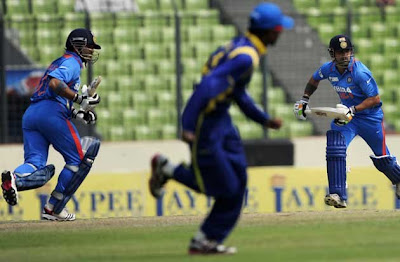The Asia Cup is nothing more than another meaningless ODI tournament in the international calendar.
 Action from the second match of the 2012 Asia Cup between India and Sri Lanka at Dhaka on 13 March 2012.
Action from the second match of the 2012 Asia Cup between India and Sri Lanka at Dhaka on 13 March 2012. "Since about, I think 1985, people have been saying that there is too much meaningless one-day cricket. Maybe it's finally time to do something about it" - Rahul Dravid at the 2011 Bradman Oration.
The International Cricket Council as well as its member boards and associations need to pay heed to the recently-retired Dravid's statement before it's too late for the 50-over format. But, going by tournaments like the ongoing Asia Cup in Bangladesh, it appears that limiting the numbers of ODIs and meaningless tournaments in the format, is the last thing on the administrators' minds.
Come to think of it, the name 'Asia Cup' is misleading and the tournament should instead have been called South Asia Cup because that's the four participating countries - India, Bangladesh, Pakistan and Sri Lanka - are geographically located. The rest of the continent is not represented, so why give the tournament such a grand name?
India and Sri Lanka, who are in the midst of transition with their national teams, also seem to have missed a trick by not naming an experimental squad with a mix of experienced and inexperienced players for the Asia Cup, as part of planning for the next phase of cricket in their respective countries. Administrators also seem to think that cricketers are machines, who can go on and on despite the hectic schedule they are subjected to; and as a result meaningless tournaments like the Asia Cup are thrown into the mix. Why don't they realise there is something called 'cricket overkill' that does more harm than good to the game?
This leads me to question the purpose of the Asia Cup itself because apart from it being a filler tournament, which appears to have been scheduled because of the 12-day window in the FTP calendar, it isn't doing anything for the development of cricket in the region.
In an ideal world, there would have been a qualifying competition between Afghanistan, Hong Kong, UAE, Nepal and Malaysia; to join the four full ICC members in the Asia Cup as it would give these countries much-needed international exposure as well as the confidence to hold their own against the 'big guns'. This would also have encouraged the development of cricket in these countries as people would have seen their teams in action.
As things stand now, the Associate and Affiliate members of the ICC face the full members only in the 50-over World Cup and the Twenty20 World Cup. While countries like Ireland, Netherlands and Afghanistan can still give a decent account of themselves despite limited exposure against the top teams, most of these teams come up short and are involved in lop-sided matches against the full members, which doesn't do anything for the development and popularisation of the game.
Afghanistan has made remarkable progress in international cricket and were rewarded for their performances when they gained ODI status in 2009, but since then have played only one match against a Test playing nation when they faced Pakistan at Sharjah last month. The Afghan players were not awed by the situation and gave an impressive account of themselves even though 2011 Bradman Oration.by seven wickets. The performance justified their rapid rise through the lower divisions, but the inexperience of playing against top teams did cost them in the end.
After that match, Pakistan captain Misbah-ul-Haq said he was impressed and added they could give other teams a tough time. "I think Afghanistan can give tough time to Zimbabwe, Bangladesh and even to better teams. It is all about experience and if they play more cricket against good teams in the world, they are going to improve," he said.
The Asia Cup would have been the ideal starting point to give Afghanistan that experience, but instead they were snubbed as this tournament apparently is meant only for four elite teams of the continent. Afghan players are understandably angry and upset about the situation and feel they are not being taken seriously enough. Afghanistan's hard-hitting batsman Mohammad Nabi told PakPassion.net, "We are not featuring in the Asia Cup, that is really disappointing. How are we going to improve if we do not play against these teams?"
A fair question indeed, but it is highly unlikely that Nabi is going to get an answer to this important and pertinent question, as the administrators only seem to be interested in adding to their respective cricket boards' treasure chest. And, until the administrators of the game understand and get their priorities right by putting cricket above everything else, it is highly likely that unnecessary tournaments like the Asia Cup will continue to be included in the international calendar as will the 'shameless profiteering'matches like the one-off Twenty20 tie between South Africa and India.